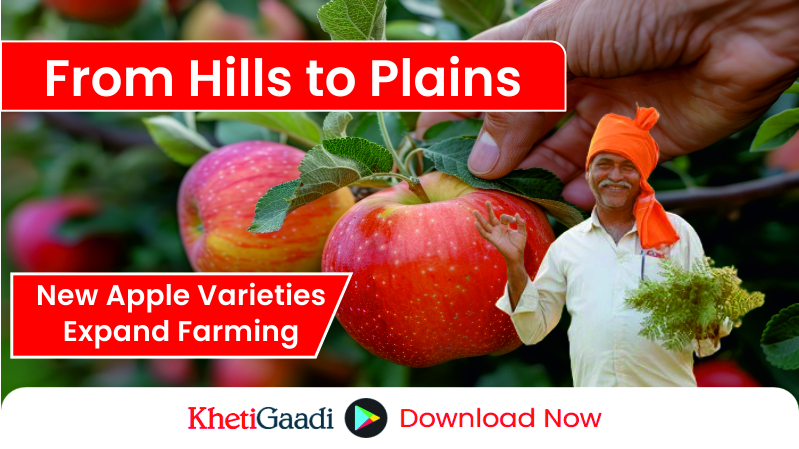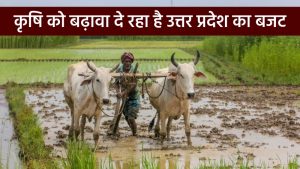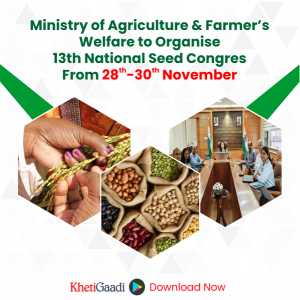Now the crop will not be limited to the mountains only
Apple farming, traditionally seen as exclusive to the mountainous regions, is now finding its way to the plains, thanks to innovative research and new apple varieties. Previously, farmers in subtropical areas were unaware of apple varieties that could thrive in their climate, as these varieties were developed by foreign research institutes without being tested locally. However, the Indian Agricultural Systems Research Institute has successfully evaluated these special varieties, proving that apple cultivation is no longer limited to the hills.
KhetiGaadi always provides right tractor information
Introducing New Apple Varieties for the Plains
The study focused on varieties that require only 250-300 hours of chilling for flowering, unlike the typical mountain varieties that need 450-500 hours. This breakthrough offers a new option for diversifying agriculture and horticulture in subtropical regions. The varieties tested include Anna, Dorset Golden, HR MN-99, In Shamir, Michael, Beverly Hills, Parlins Beauty, Tropical Beauty, Petegil, and Tamma. After four years of research, the Anna, Dorset Golden, and Michael varieties have shown particularly promising results.
Anna: This dual-purpose apple variety thrives in warmer climates and ripens early, making it ideal for the plains. The fruits of the Anna variety mature in June, developing a red hue on their yellow surface, similar to Golden Delicious apples. This variety is known for its early and abundant fruiting, and the fruits can be preserved for about seven days at normal temperatures in June. However, since Anna is a self-sterile variety, it requires a pollinator donor variety to be planted alongside it.
Dorset Golden: Developed for warmer areas, this variety also needs only 250-300 hours of chilling in winter. When planted alongside Anna, comprising about 20% of the orchard, Dorset Golden helps achieve better pollination and fruiting results.
If you wish to know organic methods to increase your overall apple cultivation yield, please call KhetiGaadi counsellor on 07875114466 or write an email to connect@khetigaadi.com
Guidelines for Successful Apple Farming in the Plains
Farmers interested in cultivating these apple varieties should first ensure the availability of saplings from government nurseries or those recognized by the National Horticulture Board. The ideal soil pH for apple farming should be between 6 and 7, with good drainage and no waterlogging. Apple trees require at least six hours of sunlight daily. It is recommended to use 15 kg of decomposed cow dung manure per plant and to plant the trees in square rows spaced 5×5 or 6×6 meters apart. While planting, ensure that the graft union—the joint where the rootstock and scion meet—remains above the soil surface.
Caring for Your Apple Trees
During November to January, about 60% of the trees’ leaves will naturally fall as they prepare for winter dormancy and the next flowering season. This leaf drop is a normal part of the tree’s life cycle and should not cause concern.
Pests and Diseases Management
Apple trees in the plains may encounter some pests and diseases. Hairy caterpillars can infest the trees in August-September, and spraying Dimethoate at a concentration of 2 ml per liter of water can control this. In July, during the rainy season, some fruits may show signs of rot. To prevent this, spraying carbendazim or thiophanate-methyl at 0.1% is recommended. For best results, it’s advisable to harvest the fruits before the onset of the rains.
By embracing these new apple varieties and following the guidelines for care, farmers in the plains can successfully cultivate apples, expanding the horizons of horticulture beyond the mountains. This breakthrough not only offers a new agricultural opportunity but also challenges the long-held belief that apple farming is limited to hilly regions.
Stay tuned with us on our WhatsApp channel for more real time updates on various agriculture related schemes and innovative cultivation methods aimed at supporting our hardworking farmers.
For more detailed information, visit https://khetigaadi.com/ regularly!
To know more about tractor price contact to our executive







Hi there, yeah this article is in fact pleasant and I have learned lot
of things from it on the topic of blogging.
thanks.
Somebody essentially help to make critically posts I might state.
This is the first time I frequented your
web page and so far? I amazed with the research you made to create this particular submit
amazing. Excellent job!
Very rapidly this web site will be famous amid all blogging visitors, due to
it’s good articles